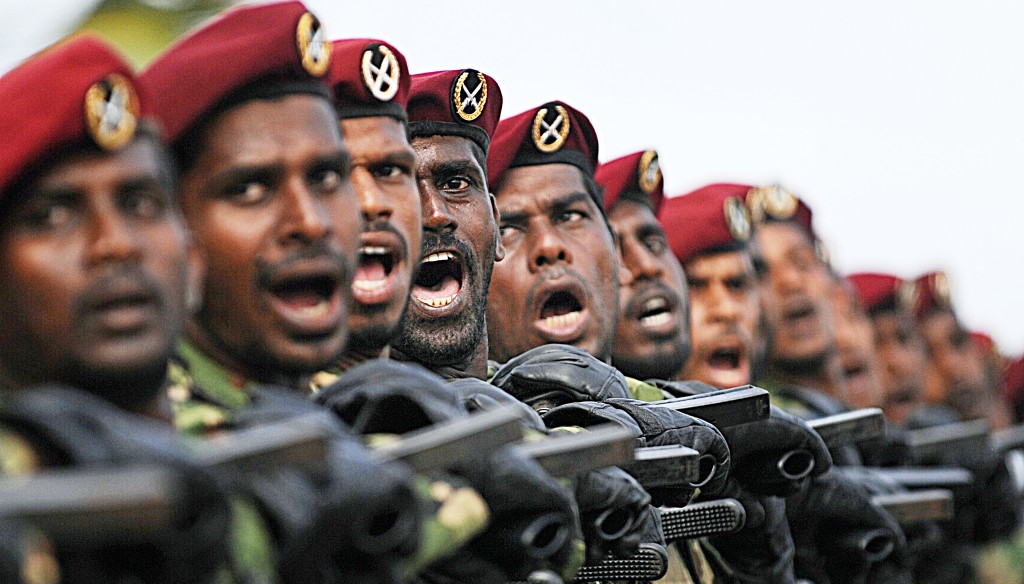Image by Ishara S. Kodikara/AFP, via FT.com
The moment I think of the war it takes me to 1995. Sri Lankans had very high expectations – a new government and a new President with a lot of promise to end the war. People in the South, North, East and West were so hopeful to see the day the war would end. I can remember me taking my elder son to the Army headquarters to enlist him. All of us the mothers were saying “now there is nothing to worry. The war has ended so our children will be safe. This a good time to enlist in the Army. These are the lucky ones”. I never knew what war was. Frankly speaking I never felt the danger that I was putting my son into. It was a good job. He would be an officer of my country’s army. I was proud. I was proud to see him on the right side of the law.
Memories of JVP insurgency came back to me. The day my father came to Kandy with both of them, early in to morning, and told me never to send them to the village as he had to keep them under the bed to save them from the Police and Army who came to houses and took all teenagers away. My sons were small but my parents were scared as they were even taking young boys.
Though it was very hard my son liked the academy. It was like a finishing school. He was trained and groomed to be a gentleman. Then it was time for my second son to join the Army. He never wanted to join the Army. He wanted to get into business, but visiting the brother at the Academy changed his mind. He joined the army while my older son was still undergoing training at the Diyathalawa Military Academy.
A lot has happened during the war. More than hundred thousand died, sixty nine thousand widows, incalculable damage to property and wealth. Sri Lanka has lost thirty years in a rapidly developing world. Five years after the war ended, what have we achieved as a country, as a people?
We know the pain of the loss of loved ones and more so of not knowing the fate of one’s loved ones. Youth with permanent disabilities and shattered lives live in the Northeast and the South. The biggest question is whether we have learned a lesson? For me, the politicians in the South and the Northeast have not learned anything from the past thirty years and are engaged in the same mistakes that their predecessors did.
On the face of it, if one drives to North, one can see roads being built and new structures coming up. But if one goes into a village, the pathetic situation of people still living in huts is clearly visible. There was never a planned resettlement taking into account the necessities of the people. It was all was done in an ad hoc manner, mostly to keep the internationals happy. Thus new conflicts are created as people are pushed to live with the little they have. The only good thing that took place after the war ended was elections in the Northern Provincial Council. The people of the North kept their trust in the Tamil National Alliance and gave them a majority of 76.28 %. But more than six months past the elections, there are serious issues of not adhering to the 13th amendment and making it possible for the provincial council to function properly. On the other hand, the politicians in the North seem to be very comfortable in being in the opposition and blaming the central government for all its problems instead of trying to do as much as possible within the available space, and demanding for the full implementation of the 13th amendment. The most worrying thing is that new issues that surface regularly. Be it the Muslim-Tamil fishermen issue in Mannar, the Muslim settlement in Wilpattu or the Indian fishermen’s issue, we are faced with complex issues which need careful thinking as well strategies that will take all aspects in to consideration. Sri Lanka cannot think in isolation. We have to remember the close proximity to India and the new developments in the Indian political arena.
It is high time that policymakers and civil society sit for a serious discussion to make a fragile peace work and move the country from post-war to a state of post-conflict.
###
This article is part of a larger collection of articles and content commemorating five years after the end of war in Sri Lanka. An introduction to this special edition by the Editor of Groundviews can be read here. This, and all other articles in the special edition, is published under a Creative Commons license that allows for republication with attribution.
